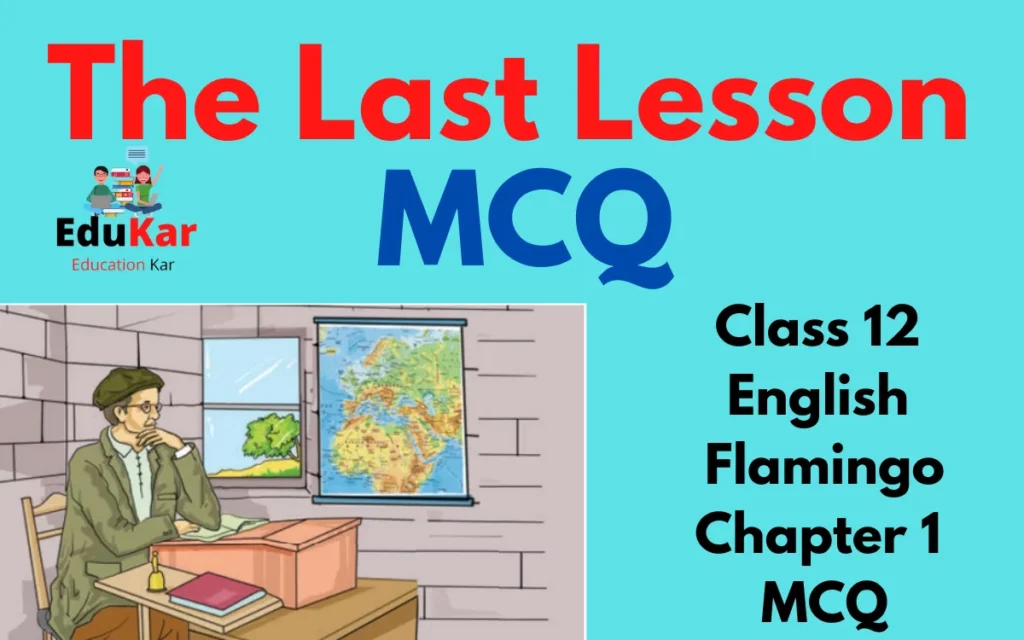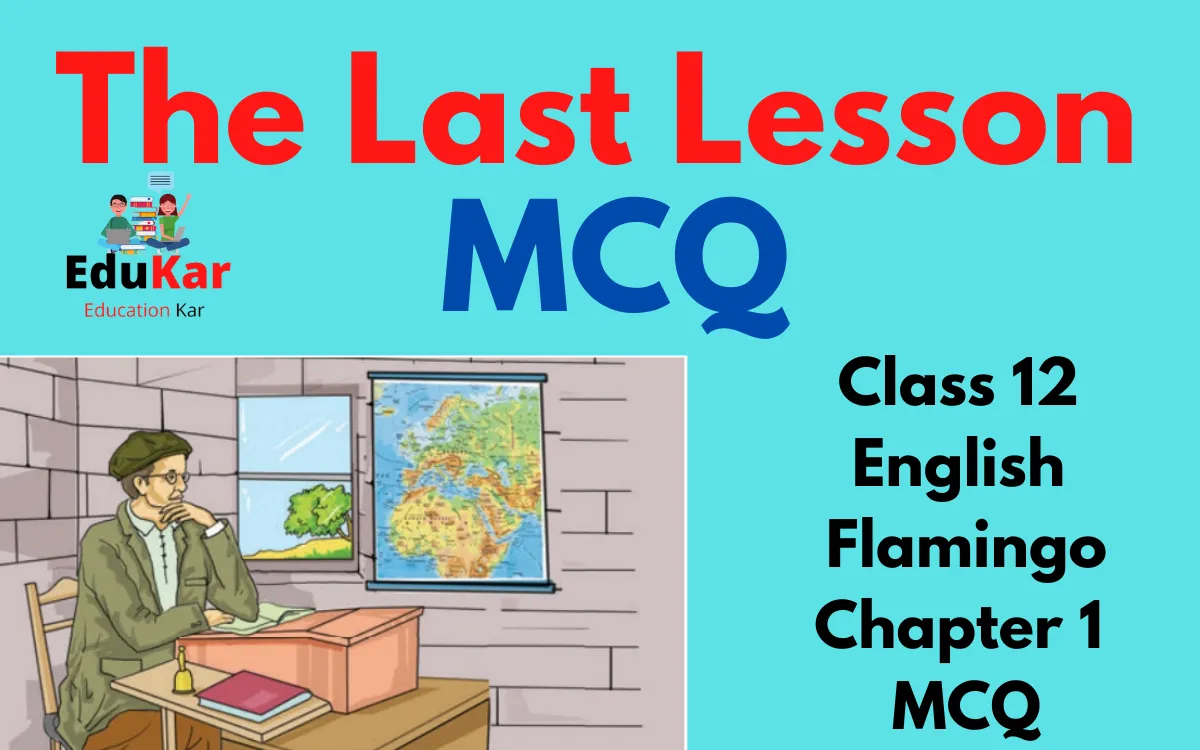
Q1– The Last Lesson was written by whom?
A) Jane Austen
B) Rabindra Nath Tagore
C) None
D) Alphonse Daudet
D) Alphonse Daudet
Q2- Which country did Alphonse Daudet hail from?
A) India
B) France
C) England
D) New Zealand
B) France
Q3- Which human characteristic is highlighted in the narrative “The Last Lesson”?
A) Male Chauvinism
B) Procrastination
C) Courage
D) Cowardice
B) Procrastination
Q4– What were the things that the Alsatian population took for granted?
A) Teachers of the school
B) Time and school
C) People around
D) Money and power
B) Time and school
Q5– What is the meaning of The Last Lesson?
A) Loss
B) Loss of freedom
C) Loss of language
D) freedom and language are lost
D) freedom and language are lost
Q6– What does the final lesson represent?
A) Change of power
B) change of Government
C) change in life
D) Change of teachers
C) change in life
Q7- What do the troops under the windows that are marching stand for?
A) During the French people’s defeat, Prussia emerged as a force.
B) The defeat of Prussia
C) The victory of French
D) None of these
A) During the French people’s defeat, Prussia emerged as a force
Q8- Where did the directives come from that only German would be taught in the Alsace and Lorraine districts?
A) France
B) Lorraine
C)Berlin
D) Germany
C) Berlin
Q9- What effects is this tale referring to?
A) Power
B)Money
C)Transition
D) people
C) Transition
Q10- Why was Franz hesitant to attend class?
A) wanted to enjoy warm Sunlight
B) wanted to see soldiers drill
C) wanted to enjoy outdoor
D) There was no prepared lecture on participles.
D) There was no prepared lecture on participles.
Q11- When Franz arrived at the school, what did he find?
A) People were dancing
B) school was closed
C) Police patrolling
D) strange quietness
D) strange quietness
Q12- Who sat in the back of the classroom?
A) weak students
B) teachers
C) monitors of the class
D) village elders
D) village elders
Q13- Franz was astonished, but why?
A) Because of village elders
B) Because of police patrolling
C) because of students’ behaviour
D) because of M. Hamel’s considerate and respectful behaviour
D) because of M. Hamel’s considerate and respectful behaviour
Q14- Why did Franz experience remorse and sadness?
A) for reaching late
B) for not learning participles
C) for change of the Government
D) for not mastering his own speech
D) for not mastering his own speech
Q15- Who did M.Hamel accuse of keeping students from going to school?
A) Parents
B) friends
C) teachers
D) watchman
A) Parents
Q16- Hauser brought what, exactly?
A) sweets
B) children
C) friends
D) old Primer
D) old Primer
Q17- What caused Franz to forget the rules and grumpiness of M. Hamel?
A) Police Patrolling
B) Strange Quietness
C) Bustle on the streets
D) The prospect of him leaving
D) The prospect of him leaving
Q18- How long did M. Hamel work for the school system?
A) 20 years
B) 35 years
C) 30 years
D) 40 years
D) 40 years
Q19- Where were the kids sent by their parents?
A) school
B) coaching
C) farms and mills
D) movies
C) farms and mills
Q20- Why did the parents send their kids to work in the mills and farms?
A) to play
B) to meet friends
C) to meet relatives
D) to earn money
D) to earn money
Q21- Why did the villagers travel to the school to greet M. Hamel?
A) to complain
B) to say goodbye
C) to gossip
D) to show gratitude
D) to show gratitude
Q22- What made Mr. M. Hamel claim that French was the most beautiful language?
A) Because it was the most logical and straightforward
B) Because it was his native language
C) Because people were from France
D) None of these
A) Because it was the most logical and straightforward
Q23- What was Franz supposed to have on hand for class that day?
A) song
B) dance
C) essay writing
D) Participles
D) Participles
Q24- What key do people have to the prison while they are slaves, according to M. Hamel?
A) power
B) aggressiveness
C) mother tongue
C) mother tongue
Q25- What was it that Franz noticed was peculiar that day?
A) quietness in the school
B) soldiers in the school
C) crowd in school
D) all of these
A) quietness in the school
Q26- What was posted that day on the bulletin board?
A) Teach only French
B) Speak only English
C) Teach only German
D) Teach all these
C) Teach only German
Q27- What adjustments did the Berlin order make to the classroom that day?
A) hustle-bustle
B) people were happy
C) teachers were sad
D) strange quietness & sadness
D) strange quietness & sadness
Q28- What caused Franz to feel differently about M. Hamel and the school?
A) Police Patrolling
B) Orders from Berlin
C) Strict words from M. Hamel
D) old Primer
B) Orders from Berlin
Q29- What was it that caused Franz and the people to recognize the value of their mother tongue?
A) M. Hamel’s words
B) School orders
C) Sudden orders from Berlin
D) School Principal
C) Sudden orders from Berlin
Q30- The phrase “Thunder Clap” “means ____ in the lesson.
A) loud but not clear
B) loud and clear
C) startling & unexpected
D) unpleasant
C) startling & unexpected
Q31- What did Mr. Hamel bring to class on his last day of attendance at the institution?
A) new pens
B) new notebooks
C) sweets
D) story books
B) new notebooks
Q32- A last lesson “What year did the novel get written?
A) 1869 – 1870
B) 1870 – 1871
C) 1872- 1873
D) 1870 – 1872
B) 1870 – 1871
Q33- Don’t rush, you will be at your school in plenty of time, which means________ .
A) getting late
B) very early
C) not early
D) early enough
D) early enough
Q34- The area in front of the bulletin board included what?
A) children
B) police
C) hawkers
D) a crowd
D) a crowd
Q35- What unfavourable tidings ever appeared on the bulletin board?
A) lost battles
B) the draft
C) orders of commanding officers
D) All of these
D) All of these
Q36- What language would the pupils begin learning the following day?
A) English
B) German
C) Dutch
D) Spanish
B) German
Q37- What exactly does it mean to be “in great dread of scolding”?
A) to be happy about it
B) highly frightened of reprimands
C) To be indifferent
D) None of these
B) highly frightened of reprimands
Q38- Why did Franz scream when he saw M. Hamel?
A) Due to his formal attire
B) because he gave sweets
C) since he was holding a flower
D) all of these
A) Due to his formal attire
Q39- What about M. Hamel’s attitude caught Franz off guard?
A) soft and kind
B) rude
C) firm and strict
D) none of these
A) soft and kind
Q40- M.Hamel, who was he?
A) a spy
B) language teacher
C) soldier
D) School Principal
B) language teacher
Q41- In the previous lesson, who sat on the back bench?
A) Franz
B) Prussians
C) the village people
D) The new teacher
C) the village people
Q42- Where did all the negative news come from for the past two years?
A) the Bulletin Board
B) Town Hall
C) school
D) M. Hamel’s House
A) the Bulletin Board
Q43- Don’t rush, you will arrive at school in plenty of time, which means_________.
A) getting late
B) very early
C) not early
D) early enough
D) early enough
Q44- What did Mr. Hamel bring to class on his last day of attendance at the institution?
A) new pens
B) new notebooks
C) sweets
D) story books
B) new notebooks
Q45- What was Franz supposed to have on hand for class that day?
A) song
B) dance
C) essay writing
D) Participles
D) Participles
Q46- Why did the villagers travel to the school to greet M. Hamel?
A) to complain
B) to say goodbye
C) to gossip
D) to show gratitude
D) to show gratitude
Q47- Franz was astonished, but why?
A) Because of village elders
B) Because of police patrolling
C) because of students’ behaviour
D) because of M. Hamel’s considerate and respectful behaviour
D) because of M. Hamel’s considerate and respectful behaviour
Q48- When Franz arrived at the school, what did he find?
A) People were dancing
B) school was closed
C) Police patrolling
D) strange quietness
D) strange quietness
Q49- Which human characteristic is highlighted in the narrative “The Last Lesson”?
A) Male Chauvinism
B) Procrastination
C) Courage
D) Cowardice
B) Procrastination
Q50- The Last Lesson was written by whom?
A) Jane Austen
B) Rabindra Nath Tagore
C) None
D) Alphonse Daudet
D) Alphonse Daudet





